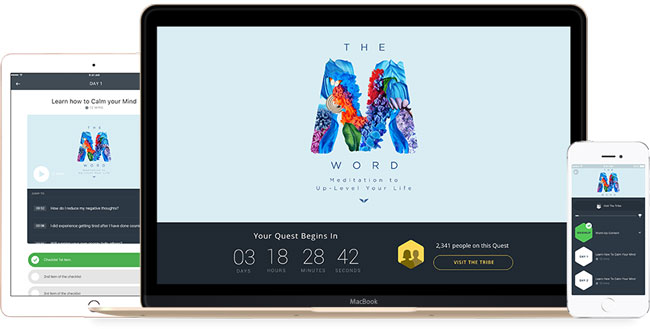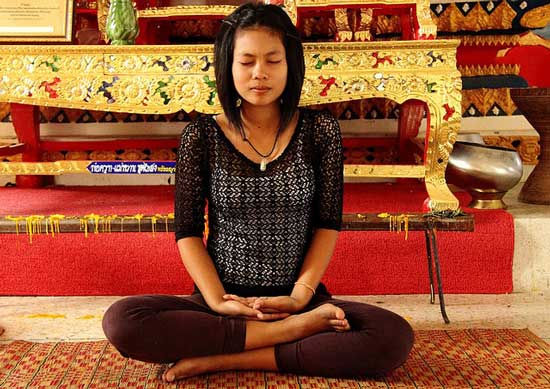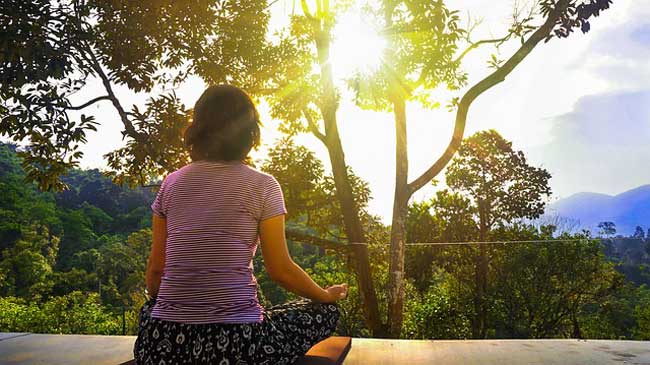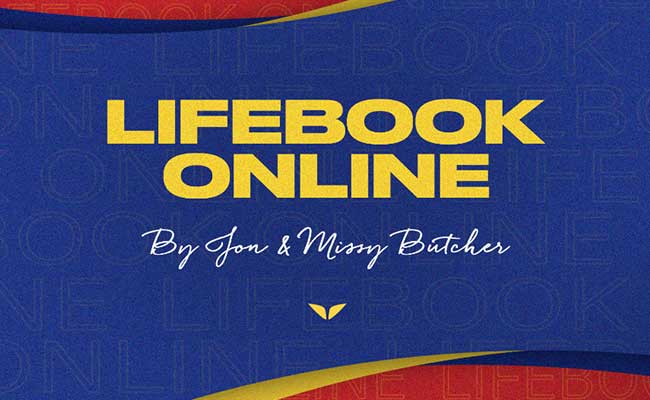What really interested me about Emily Fletcher was her backstory.
Emily went from Broadway actress – Chicago, The Producers & A Chorus Line – to meditation teacher, swapping the glitz and the glamour for what one might say is more of a middle path.
Of course like any transition there are a lot of details in between reasons for the journey, but what has transpired, perhaps inevitably, is that she has become somewhat of meditation personality, so to speak – she is a meditation advisor for Google, among others.
Like so many, Broadway ended up taking its toll.
She suffered from the usual afflictions: insomnia, lack of energy and zest for life, and apparently even grey hair, at just 27 years old – though genetically this is not uncommon, I might add.
She discovered meditation through a fellow stage actress who always seemed so calm and composed and youthful.
She wondered why everyone wasn't meditating, but quickly found out that the traditional style of meditation really isn't that easy and certainly not suited to everyone.
And this is where Emily's quest to develop an accessible type of meditation began.

The beautiful Emily Fletcher.
What inspired me to reach out to Vishen at Mindvalley and ask if I could take the Quest with Emily was the fact that many of the people I speak to – especially my readers – are often people who are attracted to mindfulness but not so enthralled with the thought of meditation – at least not in the traditional sense.
Emily Fletcher transcends the traditional meditation experience and re-packages it; bringing it more in line with modern living and utilizing it as a life support mechanism.
What Is the M Word Quest?
If you're someone who pretty much always ends up nodding off when they close their eyes…
or someone who gets bored if they sit still for five minutes…
or someone who can't stop talking…
then you've probably been put off meditation or have struggled to do it.
Th M Word is designed for someone like you.
You may have noticed that every time you sit down to try and meditate, your mind starts wandering and you lose ‘focus’.
Instead of being the vehicle for bliss, meditation turns into an endless loop of thoughts and unease that makes you feel like you are not meditating properly and that you're not cut out for receiving the benefits of this practice.
The way Emily sees it is that there are two types of meditation:
- Meditation designed for monks, and
- Meditation for the modern world.
If you've read around my blog and articles I've written across the meditation spectrum you know that I generally agree with this.
I believe that there are many ways to access a meditative state and that everyone can find a meditation practice that really suits their personality and routine, and reap the subsequent benefits (1).
Emily argues that the ancient, traditional culture around meditation didn't take into consideration the busy nature of modern life and the advanced societies that we live it. But that meditation can be adapted to help us cope with the stress that can arise out of modern living if we do not take care of the mind.
Emily's modern take on meditation is focused on self-care and enjoyment and appreciation of life, rather than “getting good” at the practice of meditation itself.
The M Word is a 33-day coaching course on the Mindvalley quest platform, which is designed to create a meditation practice that forms a foundation for your life and improves you in both a personal and professional capacity.
Note that you will keep access to the videos and audios even after the course is finished.

The Quest is accessible on any device: laptop, mobile, tablet.
The Community & Micro-Learning Technique
You go through the Quest along with hundreds of others under real-time guidance from Emily Fletcher.
So rather than a course that requires you to clock up a certain number of hours, everybody taking the course starts on the same day and you micro-learn for 10-20 minutes at a time.
The concept of community learning (there is a private Facebook group to share and support your journey) and micro-learning is that you feel part of a movement and that you don't become overwhelmed with information.
The idea of a “Quest” as opposed to a course is that it is a journey, a journey in self-development, in learning an evergreen skill that can be taken forward and utilized in your life for as long as you need it.
This has become Mindvalley's default approach in recent times and I think it's a positive one.
The Quest concept also supports the success theory of habit. If you do something consistently every day, something that isn't overwhelming and stressful, but rather enjoyable and rewarding, you are likely to stick to this habit and incorporate into your life (2).
Some people don't get on with courses because they are presented with long videos to watch each session and given so much information at the start that it feels overwhelming and can discourage learning.
Of course, you don't have to consume all the information in one go, but the fact that you are aware that you need to consume it to learn and complete the course puts some people at a psychological disadvantage.
+ Check here for the next M-Word course

Her Tallahassee warmth and charm (she was born in sunny Florida), mixed with the magnetism of a New York City showgirl, instantly makes you want to know her better.
My Personal Experience with M Word
The M Word is really easy to get on with because the sessions are short and you learn something every day – so you feel engaged and continually rewarded.
Admittedly a lot of the content is not new to me but rather repackaged techniques that I have learned over the years. But I appreciate that this is the point of the program.
Emily style is to take the traditional elements of meditation and bring them up to date in a modern format that people can easily apply to their lives.
So if you are a busy mum with kids, or a career woman / man with limited time, or someone who suffers with anxiety, sleep problems or other health issues, but you haven't partaken in meditation because you didn't really understand it and though it was more a “Buddhist monk” thing, then this is for you.
M Word is comprehensive and for the duration you would expect it to be. It brings into play a lot of mindfulness concepts that I often speak about, such as:
- How to become more present
- How to work with the breath for managing anxiety and fear
- Understanding the beginner's mind and how to use that to better fulfill your potential
- How to use the mind to access higher states of expectation, positivity and abundance
- How to utilize the power of silence for a healthier mind
- How to deal with the monkey mind and the never-ending thought stream
*Note that you can do the course at your own pace, but The M Word is designed as a 33-day quest where Emily prescribes the the right tools at the right time for optimal progress. So I would recommend that you do it along with the group in the 33 days.

Emily leading a meditation in Greece.
Getting Started
The course starts at different periods through the year – because they wait for a number of people to enroll and then start again.
At the time of writing there is a course starting in around seven days time, but the day for the next course will be listed on the page.
+ Check here for the next M-Word course
You can do the quest on any device be that mobile or desktop computer, and a free app is also made available for you so that you can do your daily Quest wherever you are.
In terms of payment there is usually a fairly big discount available, and I presume this is somewhat of a marketing ploy and that most people don't pay the full price.
There is also an unconditional 10-day money-back guarantee (from the start date of the program), which is pretty generous because it means you can drop out and get your money back up to 10 days in.
In Summary
The benefits of meditation are far-reaching and have been well documented in the scientific literature (3).
The M Word is a very well designed system for accessing these benefits and particularly suited to those who may feel that they are not so well adapted to meditation, be that because they don't have the time or the inclination.
The reality is that I don't think there is a person in the world who has practiced meditation for a sustained period of time and not felt mentally and physically healthier for it.
Whether you decide to take this course or another, or to simply begin a meditation practice independently, you will see notable benefits, including:
- Improved clarity of thought and decision-making
- Lower stress levels and feelings of anxiety
- Greater confidence and motivation
- Deeper, more restful sleep
- Better daily performance in both your personal and professional life
- Better relationship management and connection with other people





Shelley says
Hi Alfred
Loved the review!
I am a member of MindValley and Emily is definitely next on my list! I was first introduced to her during my Hypnotherapy Course with Marisa Peer. Her persona is incredibly amazing. It also helps that Emily’s voice is pleasing to listen too.
There is nothing worse than listening to a guided meditation of someone who sounds awful! I have had my fair share of Audible returns for that very reason!
I have been practising mediation for a while. I am however a keen believer in improving my life with various resources! I would still like to learn more from Emily.
For most beginners you are always told to quiet your mind! Which I think is one of the reasons so many people turn away from the benefits of mediation. As it feels like you’re doing it wrong! I get the feeling Emily can help a lot of people overcome their meditation woes!
Great read Alfred, take care
Shelley